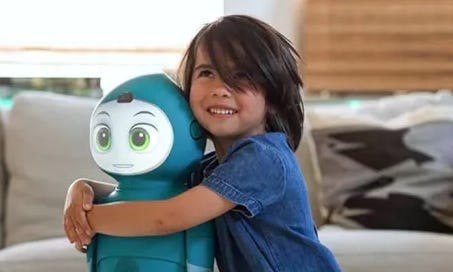Language & Social Delays: AI Robots
Well, this was a bad idea...Now parents struggle to console autistic children sobbing over dead Moxie robots. Everyone knows that AI is not new, right? And a warning about your connected car.
Chris Person provides good history on the Moxie robot that Embodied pitched to language delayed and autistic/ADD/ADHD children. I had occasionally glanced at this market niche with growing horror, so I’ll be glad if this is the beginning of the end for it.
Recommendations for troubled children:
Avoid the retail boom in AI products for children (and you).
Focus on basics with authentic Montessori materials in wood and glass. Pay up for the non-plastics, if possible.
Make a silk pillowcase doll for your child to hug.
Work on physical movement with language to develop brain-body connection.
Remove all potential allergen and behavior triggers.
Focus on non-chemical and non-machine treatments such as physical movement therapy, saunas, and nutrient-based therapies.
I refer to AI’s “retail boom” because AI is not new; companies have been trying to sell AI solutions to Wall Street and the trading industry for decades, but AI never worked out as promised.
The thing about Wall Street is that whenever millions of dollars are lost, people take notice; the same can’t be said for slightly damaged children.
After seeing the flawed AI models and losses in the financial sector for decades, I still can’t believe they’re being used at the retail level. But it makes profit sense for the companies because retail consumers are pretty much trapped — auto insurance, health insurance… you can’t avoid it.
Do you remember the controversy over AI showing Black people as gorillas? Well, if we step back from that issue, it means the AI didn’t work. It wasn’t a one-off problem — articles spewed forth about lack of Black people in tech, but that was a strawman argument (though it was true, it wasn’t the cause of this problem, and AI models are developed on huge databases with millions of data points, not on your cubicle mates’ faces). It was just visible proof that the AI models don’t work.
For example, how are you going to check the factors that go into pricing your auto insurance?
When I went to buy a car, the dealership manager said he loved his car’s app because he could automatically start and heat his car during the winter. However, he had recently faced a doubling of his car insurance premiums for some strange reason — no accidents or tickets. He tried to sell me the upgraded level of the car I wanted, touting this “connected” app feature, unaware that I was deliberately avoiding the “connected" car function. I did not want to hassle with faulty AI fiddling with my driving and reporting erroneous data out to the world.
Here’s one auto insurance + AI lawsuit for all you car owers in the US.
My next post will be cheerful and uplifting!




I’m a respite care worker for a 24 year old man who has level two autism and other developmental disorders. He is childlike but not a child. He’s good with reading. I’d like to introduce him to a Montessori style of learning but how can I adapt it to be more adultish? Are there any books or resources you can recommend?